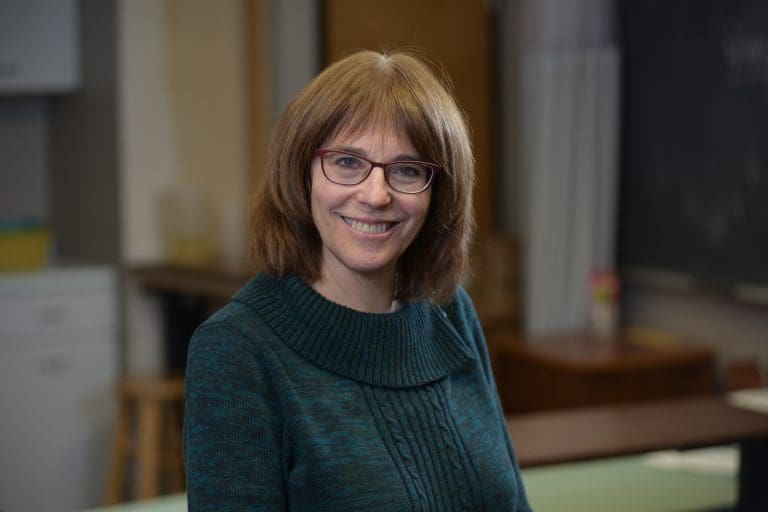
Spending twenty years with a single employer is becoming a rarity these days, but for Merle Greene, having the opportunity to work on nearly a dozen different programs over the past two decades has kept her “challenged and fresh” here at the International Institute of Minnesota.
As she wraps up her career at the Institute, Merle reflects on her wide-ranging experiences and notes how the nonprofit has expanded its reach and reputation over the years — developments that wouldn’t be possible without the fierce determination of staff members like herself.
Merle started out as a volunteer, helping New American clients write resumes and practice for job interviews. In her first staff role at the Institute, she recalls introducing map making and map reading to new arrivals, primarily women from Somalia who had not yet learned to read and write. “They made maps of the school building … I saw the wheels turning in their heads as they went through the mind-blowing process of translating three dimensions onto a two-dimensional flat surface. They succeeded!”
Her tenure at the Institute since those early days has included work in many different programs, including:
- Refugee Women’s Initiative
- Refugee Mentoring Program
- Nursing Assistant Training Program
- Youth Wave (a summer program for Iraqi, Karen, and Bhutanese teenagers)
- Communications (previous editor of the Institute newsletter and annual report)
- College readiness and support programming (managing and teaching)
- College Readiness Academy (managing and teaching)
That breadth of experiences has been what Merle has enjoyed most — teaching, managing, editing, writing. She fondly recalls tutoring immigrant Masters of Social Work candidates and advocating on their behalf to the Minnesota Board of Social Work — an example of how her work has never been confined to the walls of the Institute itself. In fact, her colleague Elizabeth Fontaine, College Readiness Academy Manager, reflects, “I have learned from Merle that our work at the Institute is incredibly connected — we don’t think or act in silos.”
Of course, there have been many challenges along the way; one in particular that she cites is also the source of great admiration from her colleagues:
- “I remember when Merle started the Anatomy and Physiology Bridge class for Saint Paul College; she would work late nights teaching herself content in order to turn around and teach it to students the next day. She was learning outside of her wheelhouse and working insanely hard in order to be what students needed. She epitomized dedication to clients and embodied the teacher-as-learner that I strive to be.” –Emily Livingston
- “I learned, as I heard Merle reciting to herself the different systems of the body and the vocabulary terms for the cardiovascular system, that a good teacher learns first and then teaches. I was always impressed with how Merle engrossed herself in the material she was teaching and how this better equipped her to put herself in her students’ shoes.” -Lynn Thompson
Those late nights paid off both for Merle and her students. “That knowledge,” she humbly recalls, “has been put to good use over the summers by teaching college-bound students with healthcare majors.”
It’s not only Institute students who have benefited from Merle’s knowledge; her colleagues — educators and not — have been unofficial pupils. From Merle they have learned:
- “To really listen and try to understand where another person might be coming from.” –Faith Loggers-Jamnik
- “To be a person of actions, rather than just words.” -Scarlett Xiong
- “How to give meaningful compliments. I can hear you, Merle, explaining why the action or words were important and positive and specific to the person you are talking to.” -Julie Garner-Pringle
- “Passion. Passion for her students, for her work, for treating herself right, and for other humans.” –Aisling Reynolds
At the Institute, we strive to make Minnesota a welcoming place for all, and for Merle, that often started over lunch. “Merle was wonderful at making anyone feel welcome,” her colleague Emilia Kaczynksi remembers. “When I first started at the Institute, Merle immediately drew me into conversation in the break room and made me feel at home.”
“From the start of my time at the Institute, I felt welcomed and included by Merle,” Cora Neisen echoes. In every conversation, Tanya Battista adds, colleagues feel her “energy and passion.”
Where does this welcoming energy come from? Perhaps, in part, from her innate curiosity. “Merle is a masterful teacher and one of the most curious human beings I have ever met,” Brooke Anttila shares. “Her curiosity about everything and everyone is electric.”
Clearly, her Institute crew isn’t going to let her disappear off into the horizon of retirement. As Merle herself looks ahead, she says she hopes to find “a volunteer niche at the Institute that is win-win-win (the Institute, the students, me).” Speaking in particular about the future of college developmental education, Merle shares she hopes that it will transform in such a way that “the Institute’s leadership in advocating for systemic change in community colleges will be rewarded. This would significantly benefit foreign-born students.”
One of those students who has benefited already is Luisana Méndez. “Merle has been a committed teacher and passionate about conveying meaningful teaching to her students,” Luisana says. “She has inspired me to push beyond my own limits, to trust my English language skills, and to never stop until I reach my goals.”
Thank you for pushing all of us, Merle!